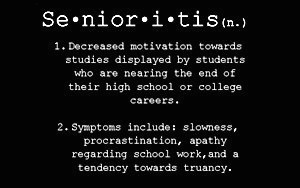Senioritis: 8 Reasons to do Your Homework
I graduated high school when I was 16; I hardly had time to have senioritis. No sooner did I have my driver’s license than I was walking across the stage in Gryffindor colors humming Pomp and Circumstance.
Not so with college.
Coming back with only one semester left I find myself in an odd spot. I’ve just returned from Oxford, which is easily one of the most amazing experiences of my life, both academically and personally, and I only have one semester left. It would be easy to be apathetic; there’s only a short time left here to invest in people and professors, the academic rhythm and challenge is vastly different, and the pulsing possibility of the future is ever before my waking eyes.
Reading assignments and multiple choice assignments can seem a bit frivolous.
There’s a world to be explored. Graduate applications to be filled out. Road trips to be gone on.
DREAMS TO BE DREAMED!
I’m being a bit dramatic. But, you get my point. Perhaps you’ve felt the same.
I’ve heard this sort of sentiment from some of my fellow Seniors. Indeed, preoccupation with the future and dis-interest in our present educational experience seems to be a theme with many college students. This, however, has gotten me to think about how I want to live my last semester, and how I want to engage with my education.
And how I’m going to motivate myself to complete the multitudinous reading charts, worksheets, and surveys I have recently been assigned.
So, below I have compiled a list of reasons for doing homework, engaging in classes, and battling off to old foe of Senioritis.
So, without further ado….
8 Reasons you should do your homework.
1. You are Privileged:
Did you know that 775 million adults are illiterate? And 500 million of that number are women? On Wednesday, I was speaking with an old spiritual director of mine and she was telling me about some work she had been doing in Kenya. She said that in Kenya most students are not able to progress in school past 8th grade. 8th Grade. This creates a cycle of poverty because to obtain opportunities that might lift individuals from poverty, they would need further education which they cannot get because they are too poor to afford it, and must work to support their families.
And I don’t want to do my reading for class.
Thinking about this could seem like a guilt trip, but I don’t like to think of it that way. Rather, it puts into context for me the incredible gift of education. Education liberates, empowers, broadens perspective, and edifies. Education has the power to make a difference between poverty and opportunity. Often, I think we think of college as a mandatory post-highschool pre-real life intermediary step, but let us never let the beauty and honor of education grow old to us. The fact that I (and you!) can get an education, and spend years of our lives devoted to studying and being mentored, being exposed to ideas, books, stories, theories and concepts is a gift that many people around the world can’t even begin to imagine.
Let us not waste this gift.
I, by no merit of my own, have been given the gift of education. It seems to me a pretty good reason to take my college career seriously, think about how I can give this gift to others, to get the most out of it that I can, and to be faithful with the gift I’ve been given. Today, that could simply mean completing my reading assignment and realizing that my “homework problem” is a sign of the incredibly privileged life I am allowed to live.
2. It will improve your GPA:
Let’s talk pragmatics:
If you do your homework, you will probably get a better grade in the class.
This will probably increase your GPA.
If you get a better GPA, it will be easier for you to do exciting things in the future without the hindrance of a cringeable GPA.
It’s easy. It helps. Just do it.
3. You will probably learn something:
Math and I have never been friends. In most things I am pretty quick to adapt. Give me paper; I can write. Give me music; I can sing. Give me books; I can read. Give me calculators; I can cry.
I took a condensed Math course over this interterm. That meant that not only did I get to do math, but I got to do a LOT of it, in a verrrryyy short amount of time. Algebra one day and trigonometry the next! Wohoo!!!! (please read the sarcasm in this statement.)
But, you know what? I learned a lot from that class. The professor was hilarious, engaging, and understanding. I realized that he knew that most of the people in his class weren’t math people, and he was okay with that. He just wanted us to be exposed to the order and beauty he saw in math for one class, even if we never used that sort of math again.
He’s great. Also, he has a Youtube channel with hilarious pranks he plays on his students. Check this out:
Through that class I learned that the only thing that will keep you from learning is an attitude which assumes you will not learn anything. When I complain, I shut down the possibility of learning because I assume it’s not possible. However, if you honestly engage your mind with a subject, you are bound to learn. Even if you profoundly disagree with the professor! Engaging your mind means you will be wrestling with new thoughts, trying out arguments, and yes, even learning.
Again, it is helpful to remember: learning is a gift.
4. You probably paid a lot of money for this class:
The fact of the matter is this: Whether from your own pocket, the pocket of your parents, or the pocket of scholarship foundations galore, your education is one of the most valuable and expensive commodities. Why waste all those hard earned dollars not doing well? It nothing else, let that money go towards a good grade, a more educated mind, and a semester of learning.
5. Because you could be influential in shaping education:
We have all had a bad class. It is a reality of college education. In these classes it is easy to check out and shake our fist at the system. However, what I’ve come to realize is that if I disengage, the system which created the shoddy learning environment I encountered will continue. If you do not like elements of your education the best thing to do is to be involved in changing it. Talk to the professor, fill out evaluations of the course, raise awareness for ways you think it would be more beneficial to learn by. If you don’t like what you are getting in your education, then be a part of changing it.
6. It will impact your integrity:
How you are acting today determines who you will be tomorrow. This is not a selective reality; I cannot pick and choose which areas of my life will determine who I will be because they are all shaping and making me.
Jesus’ words are true: “He who is faithful in a very little thing is faithful also in much; and he who is unrighteous in a very little thing is unrighteous also in much.”
This moment, this assignment, this professor. How I take hold of, respond to, faithfully own these situations will determine who I will become. Because of this, even if I find a class frustrating or inane, being faithful and working hard in the class is a matter of my own integrity and thus I should put my heart into it.
7. You owe it to your professors:
Professors are some of the most under appreciated people. It is easy to criticize teaching habits, unreasonable assignments, and boring lectures without remembering that professors spend an incredible amount of time and effort without a great deal of compensation to invest in your education. The paper that you spend all weekend writing, they spend all weekend grading. It is motivating to me to recognize and honor the work professors put into my education, and in turn doing my best to use the tools they give me well.
8. Ultimately, YOU are responsible for your own education:
The old maxim has been tried and found true: what you put in is what you will get out. No matter what the class, whether that is at a community college, a private university, or Oxford University, you have the ability to invest your mind, do research, invest time and come out having grown as a person. You also have the ability to learn nothing. I firmly believe that I could have emerged from Oxford learning very little if I had chosen to not invest my heart and mind in growing.
As the ever pithy Mark Twain notes: “I have never let my schooling interfere with my education.”
What this quote made realize is: I am the one responsible for my own education. I cannot blame a professor, a university, or a political leader for my apathy. For me, if I feel like I’m not being challenged by a class, rather than complaining about how easy it is or how exasperating the homework is, I want to invest further in reading, growing and challenging myself. Why wait for someone else to challenge me? In the words of my Mama’s new book… Own your life!
So, with that, I’m off to Lunch and homework!
Good luck, my friends!
Here’s to quickly rising word counts and spiritual gifts of speed reading.
Just remember: Education is a gift.
Peace out!
Listen to This
Having fun in California! See many of you sooooo soon!





